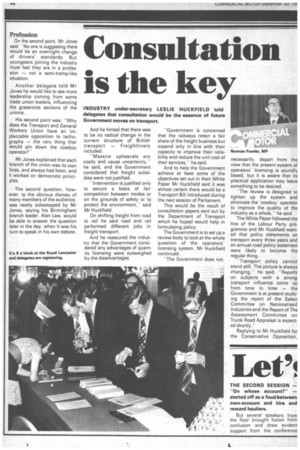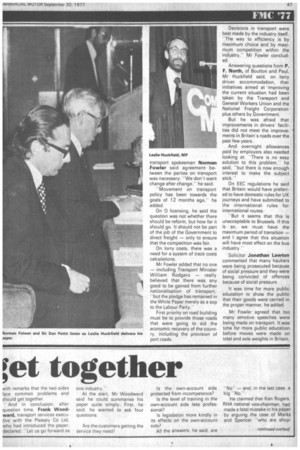Consultation is the key
Page 48

Page 49

If you've noticed an error in this article please click here to report it so we can fix it.
INDUSTRY under-secretary LESLIE HUCKFIELD told delegates that consultation would be the essence of future Government moves on transport.
And he hinted that there was to be no radical change in the current structure of British transport — Freightliners included.
"Massive upheavals are costly and cause uncertainty," he said, and the Government considered that freight subsidies were not justified.
"Intervention is justified only to secure a basis of fair competition between modes or on the grounds of safety or to protect the environment," said Mr Huckfield.
On shifting freight from road to rail he said road and rail performed different jobs in freight transport.
And he reassured the industry that the Government considered any advantages of quantity licensing were outweighed by the disadvantages.
-Government is concerned that the railways retain a fair share of the freight business but expand only in dine with their capacity to improve their reliability and reduce the unit cost of their services," he_ said.
And to help the Government achieve at least some of the objectives set out in their White Paper Mr Huckfield said it was almost certain there would be a Transport Bill introduced during the next session of Parliament.
This would be the result of consultation papers sent out by the Department of Transport which he hoped would help in formulating policy.
The Government is to set up a review body to look at the whole question of the operators' licensing system, Mr Huckfield continued.
"The Government does not, necessarily, depart from the view that the present system of operators' licensing is soundly based, but it is aware that its practical application may leave something to be desired.
"The review is designed to tighten up the system and eliminate the 'cowboy operator to improve the quality of the industry as a whole," he said.
The White Paper followed the line of the Labour Party programme and Mr Huckfield warned that policy statements on transport every three years and an annual road policy statement were likely to bccome the regular thing.
"Transport policy cannot stand still. The picture is always changing," he said. "Reports on subjects with a strong transport influence come up from time to time — the Government is at present studying the report of the Select Committee on Nationalised Industries and the Report of The Assessment Committee on Trunk Road Appraisal is expected shortly."
Replying to Mr Huckfield for the Conservative Opposition, transport spokesman Norman Fowler said agreement between the parties on transport was necessary: "We don't want change after change," he said, "Movement on transport policy has been towards the goals of 12 months ago," he added.
On 0 licensing, he said the question was not whether there should be reform, but how far it should go. It should not be part of the job of the Government to direct freight — only to ensure that the competition was fair.
On lorry costs, there was a need for a system of track costs calculations.
Mr Fowler added that no one — including Transport Minister William Rodgers — really believed that there was any good to be gained from further nationalisation of transport, "but the pledge has remained in the White Paper merely as a sop to the Labour Party."
First priority on road building must be to provide those roads that were going to aid the economic recovery of the country, including the provision of port roads. Decisions in transport were best made by the industry itself.
"The way to efficiency is by maximum choice and by maxi mum competition within the industry," Mr Fowler concluded.
Answering questions from P. F. North, of Boulton and Paul, Mr Huckfield said, on lorry driver accommodation, that initiatives aimed at • improving the current situation, had been taken by the Transport and General Workers Union and the National Freight Corporation plus others by Government.
But he was afraid that improvements in drivers facilities did not meet the improvements in Britain's roads over the past few years.
And overnight allowances paid by employers also needed looking at: "There is no easy solution to this problem," he said, "but there is now enough interest to make the subject stick."
On EEC regulations he said that Britain would have preferr ed to have domestic rules for UK journeys and have submitted to the international rules for international routes.
''But it seems that this is unacceptable to Brussels. If this is so, we must have the maximum period of transition — and I agree that this situation will have most effect on the bus industry."
Solicitor Jonathan Lawton commented that many hauliers were being prosecuted because of social pressure and they were being convicted of offences because of social pressure.
It was time for more public education to show the public that their goods were carried in the proper manner, he added.
Mr Fowler agreed that too many emotive speeches were being made on transport. It was time for more public education before moves were made on total and axle weights in Britain.






































































































